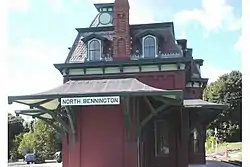North Bennington Depot
The North Bennington Depot is a historic railroad station at Depot Street and Buckley Road in North Bennington, Vermont. Built in 1880 as a passenger station, this Second Empire brick building is a surviving reminder of North Bennington's former importance as a major railroad hub in southwestern Vermont. It was listed on the National Register of Historic Places in 1973.[1]
North Bennington Depot | |
 | |
  | |
| Location | Depot St. and Buckley Rd., North Bennington, Vermont |
|---|---|
| Coordinates | 42°55′56″N 73°14′32″W |
| Area | 1 acre (0.40 ha) |
| Built | 1880 |
| Architectural style | Second Empire, Mansard |
| Part of | North Bennington Historic District (ID80000328) |
| NRHP reference No. | 73000189[1] |
| Significant dates | |
| Added to NRHP | April 11, 1973 |
| Designated CP | August 29, 1980 |
Description and history
The North Bennington Depot is located north of the village center of North Bennington, at the corner of Buckley Road and Depot Street. It is set on the south side of railroad track operated by the Vermont Railway, and just west of a junction with a spur line leading to downtown Bennington. The depot is a two-story brick structure, with a mansard roof and a foundation of cut marble. The roof has a cornice studded with brackets, and is composed of multicolored slate. Its mansard section is lined with gabled dormers housing round-arch windows, and there is a mansarded tower rising near the center of the street-facing facade. The ground floor exterior of the building is sheltered by flared canopies supported by large carved knee brackets. The interior is functionally divided into two waiting areas, with an octagonal ticket office between them on the track side. A small single-storage luggage area extends from one end of the building.[2]
In the 19th century, North Bennington developed as a major railway junction, joining the Rutland Railroad with lines serving New York and Massachusetts. This station was built by the Rutland Railroad in 1880 to improve passenger service along these lines, replacing an older wood frame structure. Ridership, and the railroad's solvency, declined in the 1930s, and the station was eventually abandoned. It was rescued from threatened demolition and restored in the 1970s, initially used to house municipal offices.[2]
References
- "National Register Information System". National Register of Historic Places. National Park Service. July 9, 2010.
- "NRHP nomination for North Bennington Depot". National Park Service. Retrieved 2016-02-23.